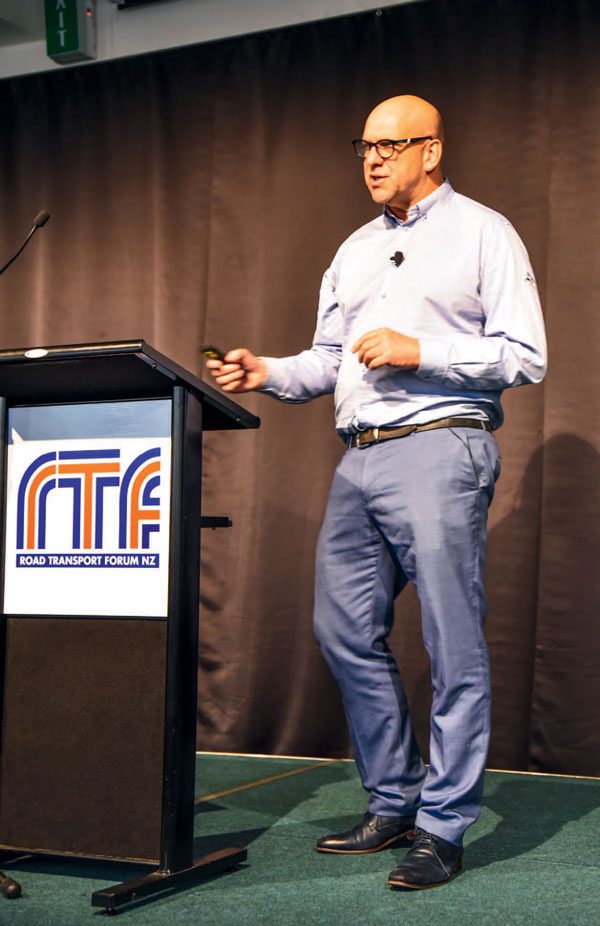RTF Conference 2019 – (Mental) health is safety
The Road Transport Forum held its annual conference for 2019 at Wairakei during September. The theme this year was ‘central focus‘ and the conference attracted 13 highprofile speakers who presented on a range of topics pertinent to business, the economy, and the industry itself. Over the next couple of issues we‘ll discuss some of the most pertinent.
Dr Tom Mulholland, founder of the Healthy Thinking Institute, has worked in various emergency departments over the past 30 years and has a keen interest in risk management. That is, a particular kind of risk management – that of how much of a risk we are to ourselves. “Health is safety – if you‘re not measuring and managing it, you‘re putting yourself at increased risk,” he said. Mulholland wasn‘t referring to physical health alone, but mental health too. In any regard, he said that most of what he‘s seen over the years has been preventable. “The transport industry has been one of the most critical industries to engage in this space. Wellbeing is not about fluffy shit, it‘s about stopping a crash, stopping you and your loved ones from dying when you don‘t need to,” Mulholland commented.
Unfortunately, a problem with many members of the transport industry is that they don‘t take the topic seriously enough. Mulholland gave the example of a 53-year-old bus driver (among others) who didn‘t take his blood pressure seriously. “Despite funding for free checks and free talks, no one stops driving to actually engage.” Then there‘s Bill, the 48-year-old stock truck driver who suffered from ‘mudguard syndrome‘. “It‘s called the ‘mudguard syndrome‘ because while everything seems shiny on the top it‘s quite shitty underneath,” Mulholland explained. A physically fit, normal-weight bloke, Bill had a heart attack running a marathon because he ignored the warning lights of high blood pressure and cholesterol.
 Photo: Do you know what your warning lights are?
Photo: Do you know what your warning lights are?
“Would you drive a truck with the warning lights on?” Mulholland asked. However, those are not the only health and wellbeing warning lights that need taking note of. Take John, the 55-year-old log truck driver whose red lights flagged depression, anxiety and stress. “Mental health is a big issue [in the trucking industry] and a lot of that is because we‘re designed to walk; when we don‘t move it has a massive effect on our mental health,” Mulholland said. Sitting in a cab all day is not the only cause, obviously. Long hours on the job, alone, and a lack of exercise, all play on a truck driver‘s mind. “Twenty percent of ACC claims today are for mental health, and it‘s just going to keep going up. The key is to see which people will submit an ACC claim, which are at risk of an accident, or which are at risk of not turning up to work…
“I can tell you that one third of your staff are in this position and are vulnerable, with very poor mental health,” he told the RTF delegates. “Probably 100% of 20- to 24-year olds have poor mental health [they are also at the biggest risk of suicide, which spikes again when people enter their 40s].” Mulholland said that we do need something more than just asking if someone is okay. Much like blood pressure or cholesterol, mental health needs to be measured and the warning lights need to be monitored. Recounting his own mental health problems, attempted suicide and subsequent recovery, Mulholland realised that it‘s not what happened to him that was important, it was his attitude towards it.
“I thought, my perspective on [everything] is making me feel miserable so if I change how I think I can change how I feel, and if I do that I can change how I act.” Incidentally, Mulholland went from being suicidal to doing stand-up comedy in six months. However, he cautions that mental health is a complicated issue and there‘s a distinction between a person‘s hardware – their brain – and their software – their mind. “Look after your hardware. There are 10 trillion networks in your brain, so if you wake up every day and think how hard your life is, you‘re reinforcing that message. If you wake up each day and think of five things to be grateful for, that‘s more effective for mild to moderate depression than taking antidepressants. If you‘re exercising, getting the right nutrition, lots of love, rest, all this stuff, you can put a lot of deposits into your neurological wellbeing.
“However, you can‘t tell someone who‘s clinically depressed just to cheer up or change their thinking. That‘s a software problem. But, if you want to change how you feel, start with changing what you control. Triggers create thoughts, which create emotions, which create actions, which create consequences. I‘m, constantly immunising myself with healthy thoughts, making my brain a lot more useful. There‘s a process to manage your thoughts, like defensive driving – defensive thinking,” he said. Mulholland noted that, at the end of the day, it‘s the individual‘s responsibility to act on their warning lights. “I‘ve noticed that people don‘t know their own numbers. We look after everything else except our most important assets, ourselves. More than 80% of workplace incidents are related to fatigue, aggravation, stress, frustration, anxiety or anger. “If you‘re not worried about your own wellbeing, maybe your kids are and maybe they want you to be around a little longer,” he concluded.



